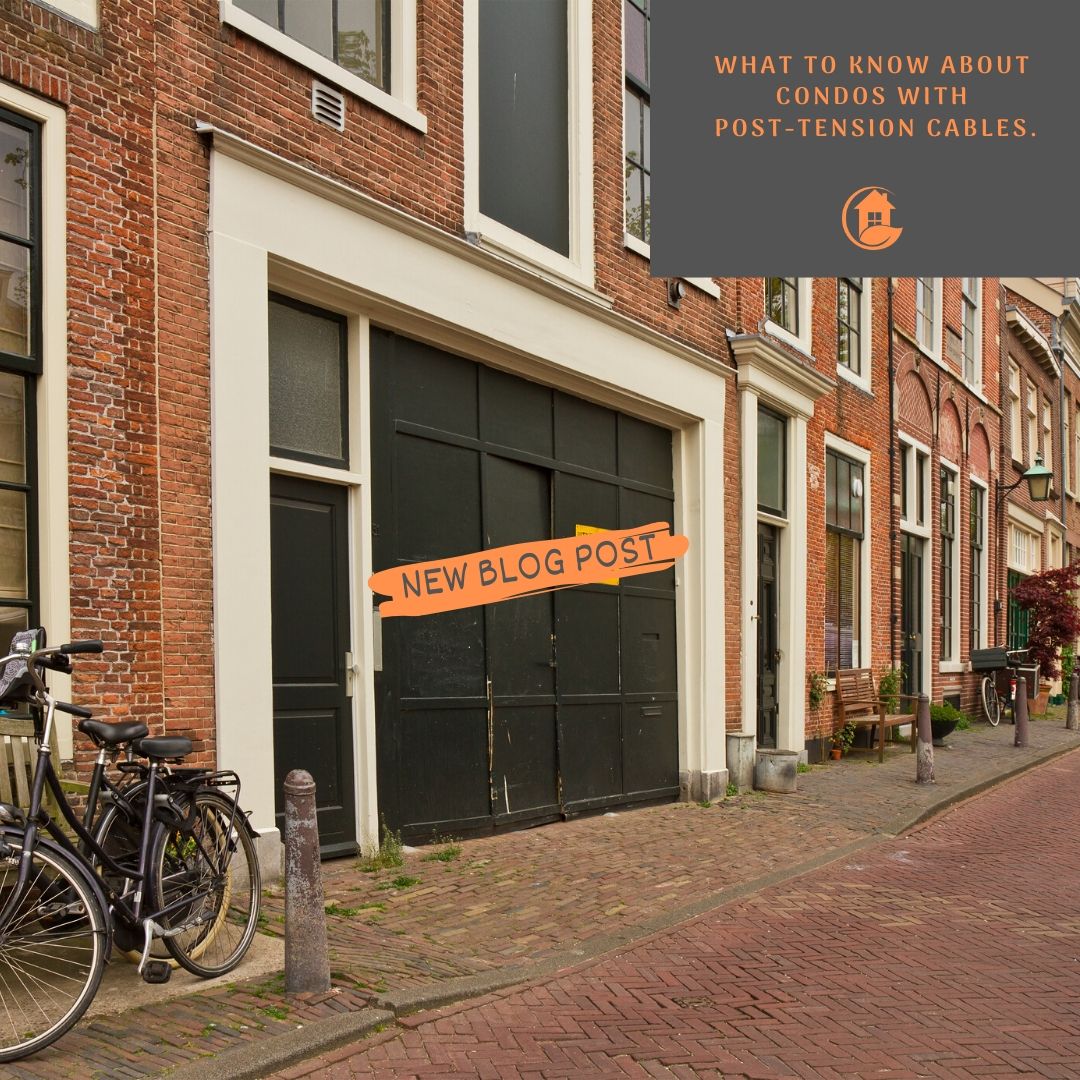CLICK HERE to view the HIGH-QUALITY version.
If you're shopping for a condo, you've likely come across units you've like in buildings with Post Tension Cables (PTC). You may have also heard concerns, warnings, and stories about them, which makes you question if they are right for you. Let's take a look at the pros and cons so you can make a confident decision on if they are right for you.
WHAT ARE THEY?
Post-tension cable concrete is a construction method used in condos, parking garages, and also office buildings, bridges, etc. It's a process by which sleeve- covered steel cables stretch along the width of a structure, anchored at either end and encased in concrete. Because the cables add strength to the slab, longer spans are possible, and fewer supports are needed. The benefits are lower construction costs and more design versatility.
WHAT COULD GO WRONG?
Some of the considerations for this construction method are the ongoing maintenance/costs and potential for corrosion and deterioration of the cables if exposed to water and oxygen, which can lead to expensive repairs. For these reasons, some lenders are cautious, and fewer mortgage insurers provide coverage. As of this writing, Genworth Insurance does not consider buildings with post-tensioning, and Canada Guaranty will consider an exception, a building constructed in 2001 or after. Canadian Mortgage Housing Corporation (CMHC) is the only mortgage insurer for buildings between 1970'-1985'.
WHY DO MORTGAGE INSURERS MATTER?
If you have less than a 20% down payment, the mortgage will need insurance, and you are limited to only lenders that work with CMHC. This limitation can also come into play when you sell and potentially reduce the number of buyers that qualify to purchase your property.
WHY WOULD YOU CONSIDER A BUILDING WITH POST-TENSION CONCRETE OR THIS AGE?
Because some of the older buildings offer greater affordability and benefit from larger square footage, ideal locations, quality construction, and features like underground parking, etc. which can add value and increase the quality of living.
Some people may focus only on buildings without post-tension concrete; however, that does not protect you from all risks as other systems could fail (i.e., plumbing, HVAC, patios, envelope membranes, roofs, etc.). These repairs can be equally as expensive and require additional funding from owners.
If you decide to consider buildings with post-tension concrete, confirm your options and the policies with your mortgage broker or bank. And below are other resources that will help you make an informed decision.
- Post-Tension Cable Report with engineer's feedback on the overall condition, if there are potential concerns and funding requirements for future repairs.
- Details of repairs maintenance and funding can are in the audited financial statements, operating budget, and reserve fund study (a physical inspection of the building's depreciating property every five years).
- Review the Board and AGM Minutes for related comments.
- Condo Document Review - Along with reading all the documents yourself, I recommend having a condo document specialist review all information for an objective summary on the financial health, Bylaws, management, etc.
Because condos in older buildings with PTC are often larger than newer and have ideal central locations, I would consider them. Iunderstandthatonresalethat there may be fewer buyers; however, if the property itself offers a higher quality of life than that is a trade-off, I am willing to consider for the right property. I would undoubtedly have the condo documents reviewed by a specialist and get their opinion.
Defects and expensive repairs and replacements can happen in buildings of any age, so the PTC is not the only potential risk.
Give yourself the most options by doing your own research, talk to a specialist in all related areas for their feedback, and be clear about your risk tolerance and capacity. Then you can make a confident decision if condo buildings with PTC are right for you.
YYC - CONDO DOCUMENT SPECIALISTS
RoyRasmusen-ExpertCondoReview 403.383.2920|rrasmusen@shaw.ca
Condo Check http://condo-check.com/
Condo Document Inspection Centre http://www.cdicinspections.com/
Condo Doc Review https://www.condodocreview.com/
.jpg)




